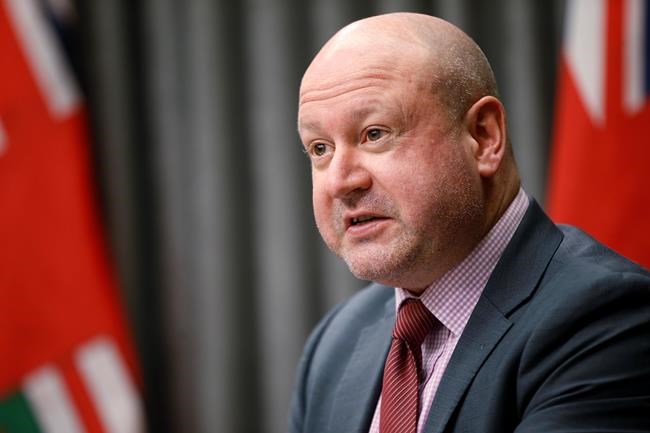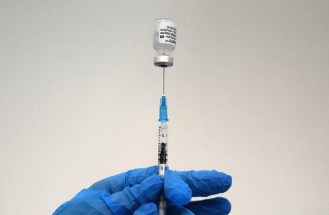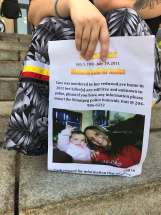A winter of discontent for unvaccinated Minimum timeline for show of proof would make it clear the wait for temporary measure to end won't be quick
Read this article for free:
or
Already have an account? Log in here »
To continue reading, please subscribe:
Monthly Digital Subscription
$0 for the first 4 weeks*
- Enjoy unlimited reading on winnipegfreepress.com
- Read the E-Edition, our digital replica newspaper
- Access News Break, our award-winning app
- Play interactive puzzles
*No charge for 4 weeks then price increases to the regular rate of $19.00 plus GST every four weeks. Offer available to new and qualified returning subscribers only. Cancel any time.
Monthly Digital Subscription
$4.75/week*
- Enjoy unlimited reading on winnipegfreepress.com
- Read the E-Edition, our digital replica newspaper
- Access News Break, our award-winning app
- Play interactive puzzles
*Billed as $19 plus GST every four weeks. Cancel any time.
To continue reading, please subscribe:
Add Free Press access to your Brandon Sun subscription for only an additional
$1 for the first 4 weeks*
*Your next subscription payment will increase by $1.00 and you will be charged $16.99 plus GST for four weeks. After four weeks, your payment will increase to $23.99 plus GST every four weeks.
Read unlimited articles for free today:
or
Already have an account? Log in here »
Hey there, time traveller!
This article was published 04/10/2021 (1527 days ago), so information in it may no longer be current.
There is one strategy the provincial government hasn’t tried yet to encourage the unvaccinated to roll up their sleeves: set a minimum timeline for Manitoba’s proof-of-vaccine policy. Six months would be a good start.
As of Sept. 3, Manitobans must be fully vaccinated against COVID-19 to access non-essential indoor places such as restaurants, sports facilities and entertainment venues. It has been an effective strategy to mitigate the spread of SARS-CoV-2, while allowing most people to return to near-normal living.
It has also helped protect businesses and not-for-profits from further financial hardship.
Trouble is, it’s a temporary measure. Many who are unvaccinated may think if they wait long enough — maybe a few weeks or a couple of months — they won’t have to get the shot. Why get vaccinated if the need for a QR code to dine out or catch a movie could be lifted by Christmas?
The province hasn’t provided clarity on that.

Dr. Brent Roussin, the chief provincial public health officer, has given hints. He warned during a technical briefing with reporters Friday that if people are waiting for proof-of-vaccine requirements to end, they will be “waiting for a long time.” But he didn’t set a timeline.
He was less forceful during a news conference later that day.
“If some of you are waiting until the proof-of-vaccine requirement is going to end, please consider the consequences of waiting,” he said.
The province needs a more aggressive strategy.
Public health should commit to implementing proof-of-vaccine requirements for at least six months, along with a warning that it may extend them beyond that if immunization rates aren’t high enough. The unvaccinated need to know these measures will be in place well into 2022 and possibly longer. It could be a very long winter for them.
So far, proof-of-vaccine measures have done little to boost uptake.
So far, proof-of-vaccine measures have done little to boost uptake. In the last two weeks of August before the imposition of new vaccine mandate rules, the number of Manitobans over the age of 12 who got their first shot grew by an average of 0.55 percentage points per week (from 81 to 82.1 per cent).
Since Sept. 3, it has climbed an average of 0.625 percentage points per week (from 82.5 to 85.2 per cent). Clearly, more incentive is needed, including in the Winnipeg Regional Health Authority region, where about 87,000 people over the age of 12 still don’t have their first shot, according to the province’s COVID-19 vaccine website. It’s not just pockets of rural Manitoba that are holding the province back.
There are other good reasons for government to make a long-term commitment to vaccine mandates. Children under 12 are still ineligible for COVID-19 vaccines and won’t likely be fully immunized until early 2022. Proof-of-vaccine rules help protect them; children are much safer in public places when everyone around them is fully vaxxed. Also, businesses and not-for-profits need to plan for the future and require greater certainty around how long these rules will be in force.
Vaccinations are working. The vast majority of COVID-19 patients admitted to Manitoba hospitals in recent weeks have been unvaccinated. Almost no one who is fully vaccinated has been admitted to an intensive-care unit for COVID-19 treatment. The evidence that vaccines substantially reduce the risk of severe illness is incontrovertible.
“If every eligible Manitoban was fully vaccinated the impact on our health-care system would be no worse than a mild to moderate flu season.” – Dr. Perry Gray
COVID-19 may be around for years, but like many other diseases, it can be managed through vaccines.
“If every eligible Manitoban was fully vaccinated the impact on our health-care system would be no worse than a mild to moderate flu season,” Dr. Perry Gray, Shared Health’s chief medical officer, said last week.
Mild to moderate flu seasons have virtually no impact on hospital capacity.
Vaccine mandates won’t exist forever, but uptake will likely have to climb above 90 per cent to eliminate them. That’s comparable to vaccine rates used to manage many other infectious diseases in Canada, such as measles or polio.
Until that happens, proof-of-vaccine measures are the only way most people can return to normal life.
A long-term commitment to them may be the only way to convince some unvaccinated Manitobans, especially the fence-sitters, to roll up their sleeves.
tom.brodbeck@freepress.mb.ca

Tom has been covering Manitoba politics since the early 1990s and joined the Winnipeg Free Press news team in 2019.
Our newsroom depends on a growing audience of readers to power our journalism. If you are not a paid reader, please consider becoming a subscriber.
Our newsroom depends on its audience of readers to power our journalism. Thank you for your support.
History
Updated on Wednesday, October 6, 2021 6:25 AM CDT: Clarifies graph
Updated on Wednesday, October 6, 2021 6:28 AM CDT: adds word "people"







